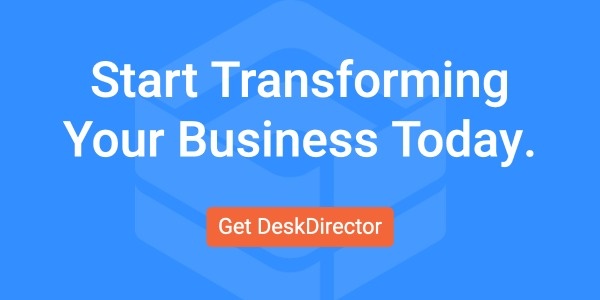Complex organizations require a lot of ticketing workflows. From onboarding new hires to resolving email issues, most modern IT help desks understand the benefits of automated processes that standardize and accelerate service.
But what happens when this complexity grows beyond your capacity to manually trigger workflows? With limited time and resources, 88% of IT professionals believe their job will get harder in the next year - and workflow triggers are a vital tool to tackle that problem.
This blog explains exactly what workflow triggers are, how they work and why DeskDirector’s advanced triggers provide a measurable advantage over the standard version found in other platforms.
Expect to learn:
- How multi-level filters improve workflow triggers
- What DeskDirector does to improve end-user experience
- Why advanced workflow triggers make it easier to resolve bugs
What Are Workflow Triggers?
Workflow triggers automatically set a ticketing workflow in motion when certain conditions are met. Rather than forcing techs to manually activate routine workflows multiple times every day, these triggers essentially automate the process to save time and standardize the ticketing process.
Many ticketing systems enable basic workflow triggers, but they often prove inefficient. Microsoft Power Automate, for example, forces techs to write triggers directly into the logic of workflows. This takes up a lot of time and makes it difficult to build multiple level filters that reflect the complexity of your organization - which is why DeskDirector created its advanced workflow triggers.

What Are Advanced Workflow Triggers?
Advanced workflow triggers simplify the process of building workflows. The instructions for when and how they run is handled within DeskDirector, to avoid writing logic directly into workflows and enabling greater flexibility and trigger complexity.
In this model, workflows simply subscribe to an event - which can be specified as featuring multiple factors. The workflow will only run when these conditions are met, and many workflows can subscribe to the same event without having to write the logic afresh each time.
Three Powerful Workflow Triggers in DeskDirector
1. Ticket is created or updated
Once a ticket is issued or updated, a workflow is triggered to determine where it is sent for approval and how it is handled. But few organizations can function efficiently if the same workflow is used for every ticket - and that is where DeskDirector’s advanced triggers come into play.
By using tags to stipulate factors such as who created the trigger and when, the system enables you to automatically trigger specific workflows. When a director creates a ticket, for example, you might want to trigger a different workflow than when a junior creates a ticket. Equally, the workflow might differ between departments.
2. A queue is created
When there is a significant delay between a ticket being issued and resolved, end-users are often frustrated and confused. This is especially the case when there is no communication about the status of the ticket - which is why queue-related triggers are so useful.
With DeskDirector’s advanced workflow triggers and the integration with Microsoft Power Automate, you can create triggers that activate a workflow when the ticketing queue reaches a certain threshold. For example, you might wish to change the priority of certain tickets when there becomes a significant backlog, or simply send a message to the issuer when it becomes clear their ticket is likely to take longer than normal to resolve.
3. Environmental triggers
Environmental triggers specify a context within which workflows should be triggered. For example, a workflow might be relevant when your office is closed. The workflow might automatically send a notification saying this ticket will be handled at a specific time tomorrow.
This demonstrates how advanced workflow triggers help create a more precise and responsive ticketing system - which ultimately makes a more positive experience for end-users.
Three Ways Workflow Triggers Benefit Your Business
1. Smoother operations
Standard workflow triggers ensure that tickets are handled, escalated and resolved in a consistent manner. DeskDirector’s advanced triggers provide an extra level of control and precision - ensuring that only the right workflows are triggered.
This streamlines and accelerates the process, meaning tickets get approved more quickly; techs can focus on resolving the issues; and end-users get a reliable, consistent service experience. In fact, studies suggest a consistent experience can double end-user satisfaction.
2. Save time
When workflow triggers are built directly into the workflow, techs are forced to rewrite the same logic multiple times. Not only is this inefficient, but it’s also a frustrating experience for professionals that would prefer to spend their time helping end-users and solving problems.
With advanced workflow triggers, multiple workflows can subscribe to the same trigger. The logic only needs to be written once, and techs save a lot of time and effort which can be reallocated to resolving tickets.
3. Centralized workflow management
While standard workflow triggers must be managed and rewritten directly within each workflow, DeskDirector creates a single place where workflows are turned on/off and logs are stored. Better still, you can see whether or not a workflow has successfully launched. Rather than going into each workflow to find bugs, you can see where bugs are and fix them more quickly.
This makes life simpler for techs, but it also means workflow issues are easier to locate and resolve. The support team can gain a fast overview of all workflows, switch off triggers that are no longer relevant and find problems faster.
Want to See Advanced Workflow Triggers in Action?










